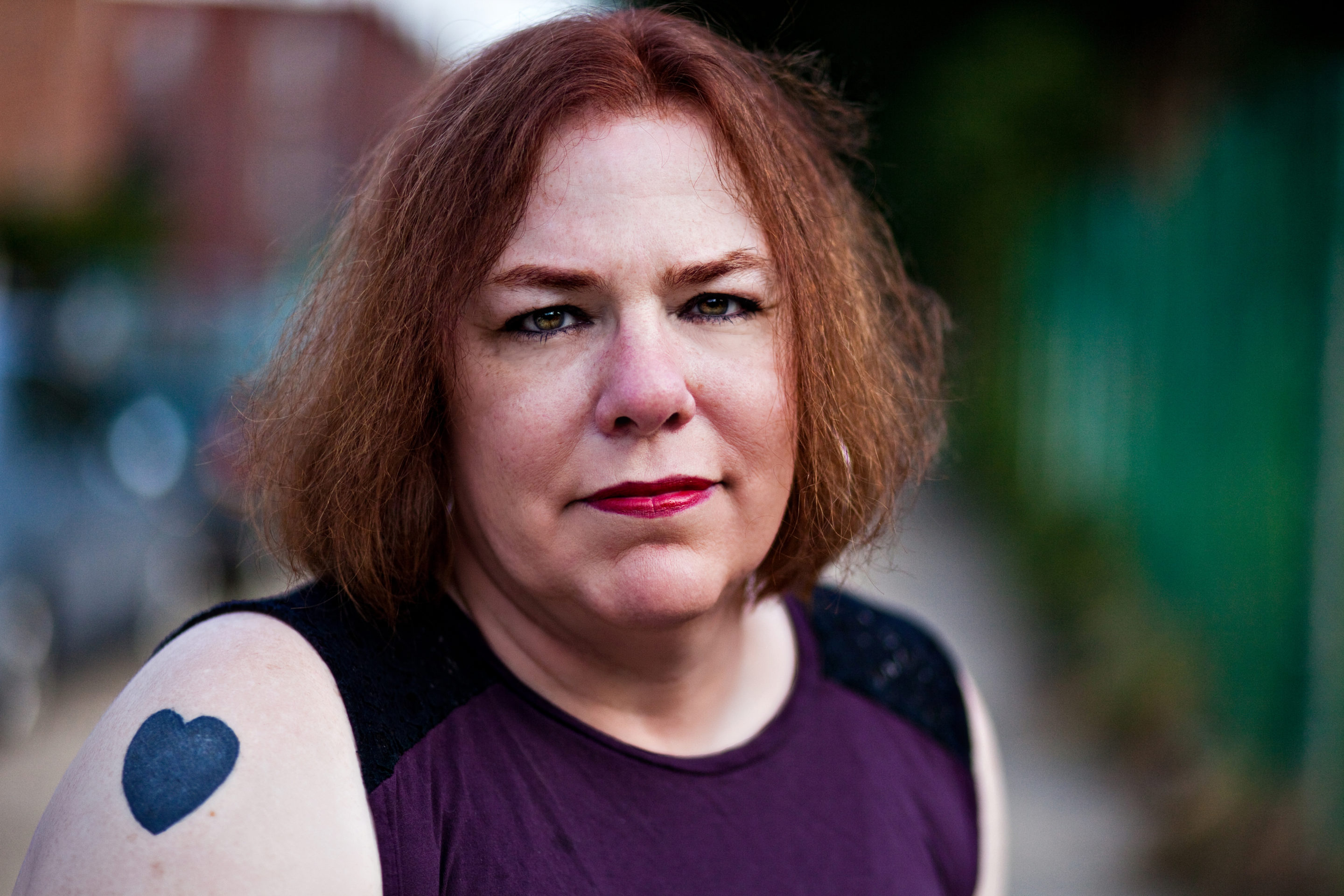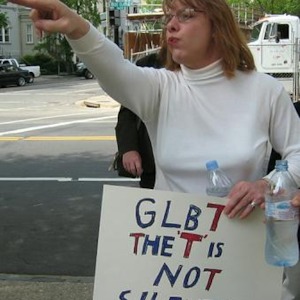
At a time when the transgender community wasn't recognized, Rebecca Juro fought for visibility
The host of "The Becky Juro show" talks about the importance of media representation and the trans community's fight for recognition.
I grew up in New Jersey and was categorized as a special-ed child, because nobody could figure out what was wrong with the strange little boy.
So I didn't say anything. I told no one because it was the late 60s, and at the time I was receiving a lot of encouragement to be a rough and tough boy. And I was. I was very violent.
I was very aggressive. I got into a lot of fights as a child so they put me on Ritalin, they put me on all these behavior modification drugs. And I went through that for the first 15 or so years of my life.
When I was 13, my parents divorced, so my father relocated to New York City, while my mom, siblings and I stayed in New Jersey.
When I was 18, I moved to New York City to live with my father because my mother didn't feel she could handle me, because I was too aggressive and I got into punk. I was punk rock. I was into leather, and had fire engine red hair for a while, spiked like Billy Idol.
That's what I looked like for a period of time. And that's what got my aggression out—letting that part of me out without negatively impacting other people. But the thing was, I knew what I wanted, but I wasn't ready to call it coming out to myself because there was no context for that in 1980.
The word transgender didn't exist. I didn't know what I was. I knew what I wanted, but I didn't have any context to fit that into. I kept it to myself and I got into a lot of trouble.
My father eventually threw me out. I lived in a little SRO hotel—this is going back many years ago. I ended up getting involved with a lot of drugs, pretty much everything short of injecting heroin.
And the only reason I didn't do that, was because I didn't like needles. I lived there for a while and eventually, when I was 22, I talked my mother into letting me go back to New Jersey.
I worked a bunch of jobs, in warehouses, in retail, as a messenger, things like that. Just like that, I found myself turning 35 and being really depressed.
At this point, I had already discovered that I was what was then known as a transsexual person—mind you, this was the 90s. I slowly started getting in contact with other trans people on the web, which was just getting started then and most of it was email lists and chat rooms.
But that was exciting back then—I mean, keep in mind that there was no Facebook or Twitter back then.
At that point, I knew what I was, but I hadn't figured out if this was something I could do. I went to work, loaded up the packages in the van, made my first stop and the second one. However, for that one, I needed to drive across this bridge.
I let go of the wheel and I let the van drift towards the side, ready to kill myself. I figured I would die by suicide and that'll be it. But the van drifted and when it got close to the side, it hit the side mirror of the van, and shattered glass all over me, making me pull the wheel away at the last second, instinctively.
Once on the other side, I got out of the van and said to myself, “Okay, well there's two choices. I really don't want to die. So what do I do?”. Suddenly, there was only one option.
That day after I finished my runs, I took myself out for lunch and drove to the local Barnes & Noble. I walked to their gay and lesbian bookshelf and found a book about being transgender.
I read it cover to cover, but only during my lunch hours, because I was hiding this, nobody else could know. It went like that for a couple of weeks and then I eventually decided it was time to come out and find help.
First, I got in touch with a therapist based in King of Prussia and I drove all the way out for 45 minutes. Let's just say it didn't really go well. But I found out about a transgender organization that had its headquarters in the same building.
They helped me get the information I needed, and I was able to find a psychologist close to my home. You have to understand, though, as a special-ed kid, I grew up being surrounded by psychologists, so I knew how to play the game and was ready to fight.
But she said, “Okay, you are transexual" (again, things were different back then)."What do you want to do about it?” I wasn't prepared for things to go so smooth. Over the course of six years, I came out more and more—lost a lot of friends in the process, but nothing is harder than facing your own family.
They were kind of weirded out by it. My mother wasn't thrilled, but she came around. My father never had a problem, he just wanted to understand more so I took them to my therapist.
Slowly but surely, I began living, changing my name, and my legal gender. And it was very difficult. I couldn't get a job for six years. No one would hire me.
They all loved my resume, but when I actually showed up in their office, and they realized I was trans, things seem to change. It got to a point where I couldn't even get a job in retail anymore, so I started writing and realizing the lack of representation and coverage in the transgender community.
There was no real market for trans media when I started, so a couple of other people and I started writing because there was nothing else, no other media covering our community.
I published a Yahoo email list called Becky's List and sent it out for free. It was about things the government did relating to us, and general news that could be of interest for transgender people.
Eventually, that turned into a radio show that I did for 13 years. Over the course of that time, I became more well known and started getting work in the LGBTQ media [as] people recognized my name.
During the 2000s, the transgender community had some issues with the Human Rights Campaign. It was a whole fight and there were protests. I tried contacting other media and radio stations to cover the situation, but the answer was the same: “We don't want a confrontational show."
I was very frustrated, and talking to my friend Marti about it. She said, “Is there any reason why we couldn't do a show of our own?”
She was right, but it was easier said than done. It took us two years to get Trans Sister Radio on the air. It lasted about a year, then Marty and I went our separate ways.
In the meantime, we protested The Human Rights Campaign in Washington, while lobbying Congress. At that point, we were asking for the LGBT community to be recognized without having to drop the T.

It was a mess. I was with New Jersey AIDS, and most officials we talked to wouldn't meet with us. They sent their aides and their aides did nothing. Later we found out that The Human Rights Campaign had lobbied before us, and were ready to move towards the inclusion of the gay and lesbian community, even if it meant leaving the transgender community behind.
RELATED CONTENT
They insisted it was going to be momentarily, and that they would come back for us, but we were not having it.
I became a rabble-rouser. It is not always a good idea, but in this case, it was effective for me. Other transgender people and I started writing articles about it.
To this day, the one I wrote on that topic is my most famous piece. It went viral—well, as viral as something could have gone in the earlier stages of the internet. Suddenly media started to report on us because there was drama, and it became a political issue for our community.
That completely turned the tables, and even the politicians who previously were opposed now wanted to support the idea of a community as a whole, LGBT.
They had to pick sides and I personally don't think there is enough coverage about what happened during that era. So many of the people that fought for that either aren't around anymore or disappeared from the movement.
As for me, that opened the door for my work to appear in outlets like The Advocate, The Bilerico Project, The Washington Blade, Gay City News, Windy City Times, LGBT Nation, and The HuffPost.

People think there was Sylvia Rivera and the next thing you know there was Laverne Cox, but it is not like that. So much has happened in the middle.
We fought for our right to exist at a time where there was not even a name for us. For decades, the battle was about our existence being acknowledged. Now it is about being seen as everyone else.
You have to fight for what you believe in. Nothing comes easy, and for a lot of the liberties everyone in this country enjoys, there were people behind them that fought to make them possible.
We live in a society where nobody wants to be different. But we are different and that is okay. It was a fight back then and it still is to this day, but things seem to be getting better.
At least that is what I tell my little sister. She is 25 years old, openly self-identifies as part of the LGBTQ community and is a drag king.
She explores gender in ways I didn't even think were possible when I was her age.
We were about the fight, we had to change things because no one was going to do it for us, and I did my part. Now it’s her generation’s turn to do their part.
Nothing in life comes easy, you have to fight for what you want and people my age have something young people don’t: perspective. Don’t worry, that will come with age, but for now you need to know that even when we have made so much progress and we are being heard—we might not be listened to but we are being heard—the fight is not over.
Now fighting for non-binary to be widely recognized is her generation’s fight. I did my part, marching, rallying, writing. Now, as I become an elder, it is my time to sit back a little bit and give the stage to the younger generation while I keep working on my book, which recounts the social fights of my era, and who knows, maybe even going back as a regular staff position journalist.
My mother died at 76, my father died at 76. I am 57 years old now. I figure I don't have that long left, but before I leave this world, I'd like to see real equality for people despite their gender identity. I want a better world for my sister, one where sexuality or gender will never be issued to her.











LEAVE A COMMENT: